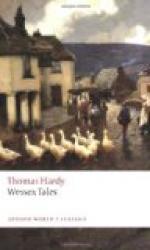In a quarter of an hour the messenger came back. Mr. Barnet had left the hotel early in the morning of the day before, but he had stated that he would probably return in the course of the week.
The note was sent back, to be given to him immediately on his arrival.
There was no sign from the inn that this desired event had occurred, either on the next day or the day following. On both nights she had been restless, and had scarcely slept half-an-hour.
On the Saturday, putting off all diffidence, Lucy went herself to the Black-Bull, and questioned the staff closely.
Mr. Barnet had cursorily remarked when leaving that he might return on the Thursday or Friday, but they were directed not to reserve a room for him unless he should write.
He had left no address.
Lucy sorrowfully took back her note went home, and resolved to wait.
She did wait—years and years—but Barnet never reappeared.
April 1880.
INTERLOPERS AT THE KNAP
CHAPTER I
The north road from Casterbridge is tedious and lonely, especially in winter-time. Along a part of its course it connects with Long-Ash Lane, a monotonous track without a village or hamlet for many miles, and with very seldom a turning. Unapprized wayfarers who are too old, or too young, or in other respects too weak for the distance to be traversed, but who, nevertheless, have to walk it, say, as they look wistfully ahead, ’Once at the top of that hill, and I must surely see the end of Long-Ash Lane!’ But they reach the hilltop, and Long-Ash Lane stretches in front as mercilessly as before.
Some few years ago a certain farmer was riding through this lane in the gloom of a winter evening. The farmer’s friend, a dairyman, was riding beside him. A few paces in the rear rode the farmer’s man. All three were well horsed on strong, round-barrelled cobs; and to be well horsed was to be in better spirits about Long-Ash Lane than poor pedestrians could attain to during its passage.
But the farmer did not talk much to his friend as he rode along. The enterprise which had brought him there filled his mind; for in truth it was important. Not altogether so important was it, perhaps, when estimated by its value to society at large; but if the true measure of a deed be proportionate to the space it occupies in the heart of him who undertakes it, Farmer Charles Darton’s business to-night could hold its own with the business of kings.
He was a large farmer. His turnover, as it is called, was probably thirty thousand pounds a year. He had a great many draught horses, a great many milch cows, and of sheep a multitude. This comfortable position was, however, none of his own making. It had been created by his father, a man of a very different stamp from the present representative of the line.




